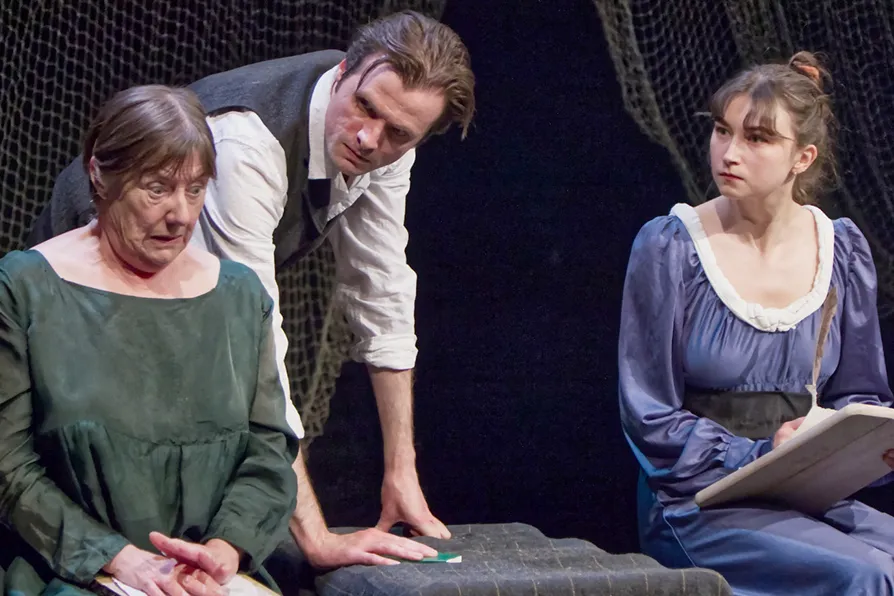JOHN GREEN, MARIA DUARTE and ANGUS REID review Fukushima: A Nuclear Nightmare, Man on the Run, If I Had Legs I’d Kick You, and Cold Storage
MARY CONWAY is disappointed by a play that presents Shelley as polite and conventional man who lives a chocolate box, cottagey life

 The cast in Regarding Shelley / Pic: Upstairs at the Gatehouse
The cast in Regarding Shelley / Pic: Upstairs at the Gatehouse
Regarding Shelley
Upstairs at the Gatehouse
★★
PERCY BYSSHE SHELLEY lived a short, sharp, hugely eventful life, his recognition as one of the greatest of the English Romantic poets landing only after his tragic death at 29 in a boating accident.
While his poetry today knows worldwide fame, his radical political opinions and unconventional personal life have less exposure, even though they profoundly resonate in the modern world.
Playwright Richard Bradbury sets out to redress the balance in this, his new work in which he focuses on the hostility shown to Shelley by the profoundly reactionary Tory government and ruling class of the time.
It’s a fascinating theme and could indeed be the stuff of a meaningful, contemporary play. But, as it stands, it misses its mark.
The play seems to start half way through as though we have already imbibed all that Shelley thinks and feels. It’s not enough to see him write and distribute a few pamphlets, nor to hear a couple of sentences about the exploitation of Ireland by the rapacious English.
For this play to work we have to feel the poet’s passion and share his rage. After all, what exactly makes a brilliant young man of aristocratic lineage who went to Eton and Oxford castigate the establishment in the way that he does? What is the deep injustice we must share with him?
We wait and watch and are never really told – a wasted opportunity in a play set against the backdrop of the recent French revolution, the rise of Napoleon, desperate social upheaval and a furnace of political radicalism.
We need to see the excesses of Shelley in this context. Instead, we are offered a rather polite and conventional man who lives a chocolate box, cottagey life with his young and amiably inoffensive wife… profoundly untrue.
Passion there is none; urgency hardly at all; and the characters, while speaking endless lyrical lines, never become the stuff of drama.
The plot sees Shelley under surveillance by Lord Sidmouth, no less… he who had been prime minister. Indeed, the play opens very promisingly with a screened video clip of Sidmouth seated at his desk, oozing entitlement and power and smugly pronouncing his establishment views on Ireland, poets and dissidents.
We immediately expect that the play will see Shelley and Sidmouth in full open conflict. But no. More video clips of Sidmouth punctuate the action but never engage with it and tread the same old ground.
Shelley escapes from Ireland and rents a place in Devon. Here domesticity supplants drama and there seem to be no characters of any depth to stir the blood.
It’s a shame because this is potentially a worthwhile project. With a big rethink, this could be a passionate drama where a wildly talented, publicly ostracised man challenges a world where power is vested in the privileged few. Get that right and we’ll all be cheering till the end.
Ends May 25 2025. Box Office at 020 8340 3488.

In his second round-up, EWAN CAMERON picks excellent solo shows that deal with Scottishness, Englishness and race as highlights

Borrowed Time: Lennon’s Last Decade, Parthenope, Where Dragons Live and Thunderbolts* reviewed by MICHAL BONCZA and MARIA DUARTE

Badenoch under pressure to sack shadow justice secretary









